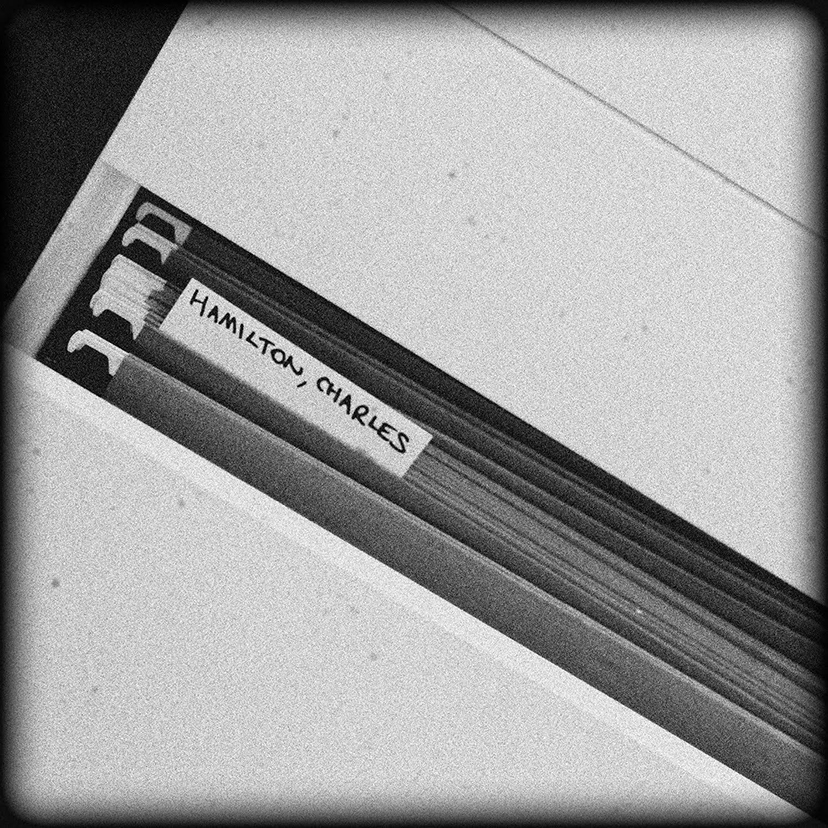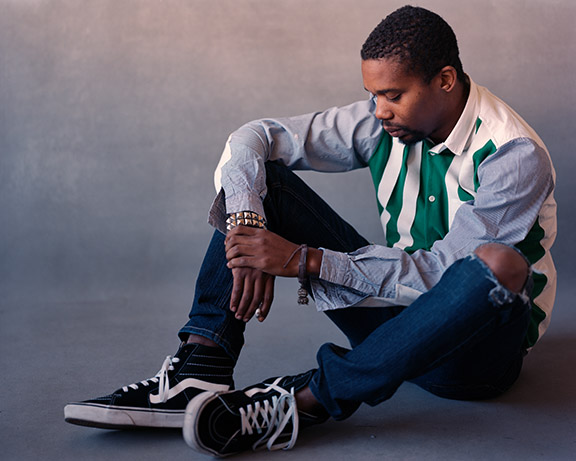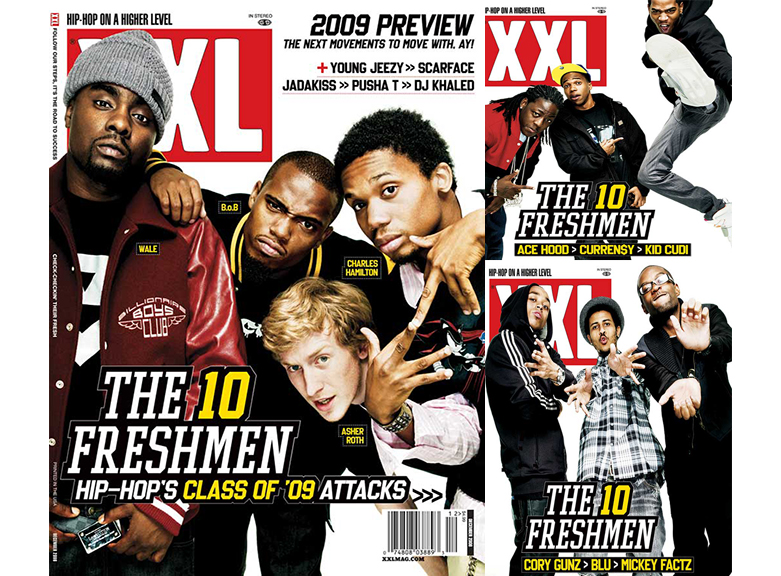Charles Hamilton Speaks Candidly On Music, His Regrets, His Truths & His Future
My first formal introduction to Charles Hamilton came in the Summer of 2005. I didn’t even know he was an artist initially. He showed up at a teen poetry slam I had put together in Harlem and was in attendance as a journalist, ironically. He covered the slam for The Amsterdam News and I believe he eventually wrote a piece about it and what we were doing right on 125th Street, his stomping ground. Thus began our long, uncanny history.
I won’t claim to know or understand Charles Hamilton. And I’m not sure anyone could say that they can, besides his late mother, who may be the only person who could have ever made that claim. But every time I think of Charles, I think of that young writer who walked into my event, with his pink tie and pink vest and light pink collared shirt. Professional and smart, a precocious teen. When I found out he was a musical artist and I heard his stuff, I knew I had to work with him. And we worked.
When he found mainstream success and Interscope and XXL took notice, among others, I wasn’t surprised, and no one who had met him, or had been introduced to his music could say that they were shocked by his success. Like many of his counterparts, I stood back in amazement watching him reach the heights he spoke about at shows and in passing conversations. At the height of his success, I couldn’t even get an interview, but every time we would connect, the love and admiration was there. When The Pink Lavalamp officially hit the streets, Charles Hamilton was on the verge of legendary status, soon thereafter appearing in videos with Kanye West and The Game among others.
The ebbs and flows of the music business, and of life have taken their toll. Charles Hamilton is back to proving himself in an industry that can be forgetful of talent, but holds on to the negatives. On December 9th, he FINALLY released his debut retail album, Hamilton, Charles, a spectacular twelve track project that’s gone under the radar. But I remain convinced that Charles is one of the most talented artists the industry has encountered in the last decade. And I’ll continue to spotlight his talent and music for as long as I can.
Charles has thanked me on a number of occasions for that opportunity out in Harlem, surrounding him with some of the people in the room who continue to be a part of his life. But I don’t know if I’ve ever thanked him. For, among other things, coming into our lives and showing us that dreams can come true. And that music is a universal language that can help guide us through any pain and any emotion. (And for not throwing any chairs.)
It’s only right that I finally caught up with Mr. Hamilton recently to talk music, an already tumultuous career, a year of downs and ups, and of course, a return to mainstream music. As with everything with Charles, its real, with some… uhh, moments.
Here goes. Charles Hamilton, From The Heart. With Love.
Parlé Mag: 2016 has been an up and down year for you both professionally and especially personally. But with your debut retail album, Hamilton, Charles finally in stores, what does it mean to you to actually have gotten to this point?
Charles Hamilton: Well it kind of puts me in a position to demand more respect now that I have a retail album out. Unfortunately, it’s not a physical release so I can’t be listed amongst certain artists who have a record in stores or physical copies, but it’s a new day, it’s a new generation so hopefully I can end up being finally noted for something, you know what I mean?

Parlé Mag: Right, right. So why wasn’t it released physically? Was that a label decision?
Charles Hamilton: There’s a few reasons, but I think the main reason is, I guess they didn’t want to spend as much money on a project that was not necessarily guaranteed to be a big ticket item. You know, whenever a label or a distributor puts something in the stores, you know, they are expecting a return on investment. I don’t cost that much money, but my talent is far beyond how much money I got. In this situation they felt the music wasn’t a guaranteed success. There’s some hit singles on there but they just felt like it’s a little too left to be in the mainstream that would sell a bunch of records. And if they disagree than they can reach out to me.
Parlé Mag: Backtracking just a little bit, how did you end up in the label situation with Universal Republic?
Charles Hamilton: I signed a management agreement with Turn First and First Access and I signed that agreement after signing an agreement with two neighborhood friends of mine that I went to high school with. It was kind of a dire situation to begin with and it just went from bad to worse. But now it’s seemingly ironing itself out.
Parlé Mag: When did you sign that second management deal?
Charles Hamilton: 2014.
Parlé Mag: Okay, and then in 2015 you released your first official single after a few years, “New York Raining”, which featured Rita Ora. The track was featured on the television show, Empire and on their soundtrack as a bonus track as well. You followed that up with The Black Box EP, how did all that come together?
Charles Hamilton: Well it was just about selecting the right records, which would hit the mainstream as hard as it could. The “New York Raining” single, there’s as little controversy why that song in particular was released, but after “New York Raining” it was supposed to be, what are we going to follow-up with. It picked up steam overseas but it didn’t—in my eyes it wasn’t as successful as it should have been. At the point of the release of the EP it was like okay, we have a strong following with the new music, not just the old music. My twitter numbers jumped up, Facebook fans were coming out of no where. So it just looked like the best thing to do would be to release fourth quarter. It worked it’s just… here we are.
Parlé Mag: Why wasn’t “New York Raining” featured on The Black Box?
Charles Hamilton: The record lost steam towards the end of the year and management didn’t think it would be lucrative to place it on the EP. Also, it was [already released] on the Empire soundtrack.
Parlé Mag: I’ll circle back to the music, but I want to jump to the recently released documentary by Red Bull, titled Let It Play… Faultlines. How did that come together?
Charles Hamilton: I had just finished performing with Lupe in Los Angeles at the House of Blues and I got approached by the documentary’s director, Fred Scott saying that Red Bull and Pulse Films were interested in doing a documentary on my life story. We met at the studio a few days later. He met my mom, had a conversation with her and we decided that it was time to tell the story.
Parlé Mag: Did you have any—
Charles Hamilton: Reservations? Yes, yes. I had several reservations because in recent years the things that have been going on seem to overshadow my past. So I was just like well, people probably don’t even care about something they should already know about. So I didn’t really know what to say or do… I just told the story like I was supposed to.
Parlé Mag: Having so many things play out in that documentary and having to relive so much of that and provide details—I mean obviously there’s stuff from your childhood, but then even the more recent years. How hard was it doing all that.
Charles Hamilton: Because I live through it every day I have to talk about it. So I’m not comfortable talking about it, but the people who are comfortable talking about it are the perpetrators, so it’s like I have to beat them to talking about it because they’ll take all the glory for it and just leave me on the side. So it’s like why don’t I just tell you the truth about my life and my situation and hopefully you’ll deal with it.
Parlé Mag: One of the things that was touched on in the documentary but wasn’t really explored was that after you got that initial record deal and leading up to your first release, The Pink Lavalamp, you released a single titled, “Brooklyn Girls”. You didn’t want to put it on that debut album, which became the first major rift with the label. Why didn’t you want it on that project?
Charles Hamilton: It didn’t sound like anything else on the album. Sonically, lyrically… there’s a lot of sarcasm in “Brooklyn Girls”. I was coming from the heart on The Pink Lavalamp so I felt like shit, there it is, don’t like me then. There was so much stuff on The Pink Lavalamp and there was a lot of things that I didn’t talk about on The Pink Lavalamp, but I just felt like “Brooklyn Girls” didn’t belong on the album.
Parlé Mag: So does that go down as a regret?
Charles Hamilton: Uhhhh… I know more about the situation so no its not a regret, but as far as being a mainstream success, yes it is.
Parlé Mag: Another potential regret… you recently brought it up on your Facebook page and I believe you said it was your first time discussing it. But going back to that night with Briana, those comments and that punch. In your estimation was that the final straw that broke any chance of a mainstream Charles Hamilton?
Charles Hamilton: I didn’t care. I did what everyone wanted to do in the Industry [at that time], which was work with Eminem. Briana didn’t work with Eminem, so no matter what she does as an artist I’m on a higher level than her. Every hater hasn’t worked with Eminem so no matter what they do I’m on a greater level than they are. None of them worked with Pharrell, none of them know who Jimmy Iovine is, so I won before I even opened my mouth. She wanted to battle me???
Fuck outta here. That’s what the line was, I really don’t care. But she wanted to take subliminal low blows, how about I put your shit on blast. If you are a judge of character, you will see the dynamic between us as far as this: I’m not on a reality show, you know what I mean? And she’s doing whatever she wants with her life, but she’s not happy. And I wasn’t happy when I was with her, but I was under certain pretenses. I can never be happy. So as much emotion and skill that was in the freestyle thing, I don’t see how it could be the end for me. However, since this world is so macho, it probably meant the end in the eyes of people who put on a mixtape of mine and only looked for the hard records.

Parlé Mag: I get it. Okay, switching gears completely, I can’t do the interview without asking about your mom. First and foremost, my condolences… Knowing how involved she was in your life, how much she wanted to see you and your music succeed, and how hard she fought to get this retail debut out before she passed earlier this year, how does it make you feel to accomplish that goal for her?
Charles Hamilton: Well I can die now and see my mom and say, “I did it… now don’t ask me why I’m dead.”
I’m dead ass.
I did what I set out to do after x amount of years, tears, pain, fear, strains, whatever. I literally lived through it to make an album. Now on the album I definitely talk about some of it, but I don’t get into graphic detail. I prefer to save the graphic details for the music I produce for myself. But you know, hopefully the project is enjoyable and we can reach some kind of success. But I’m just very numb to my mom’s passing.
Parlé Mag: Right.
Charles Hamilton: Every day I learn how much my mom loved me. Like every day! So now it’s like, great… the only person I can resent is myself.
Parlé Mag: Since The Pink Lavalamp, and even after that unofficial second album, The Perfect Life, you’ve put out sooooo much music, to the tune of over 100 mixtapes. We can talk about how much you love music, but that’s still a lot of music out there. How do you put out so much and why such overload?
Charles Hamilton: Well, how, for lack of better words, it’s my passion. I love making music. I love everything about music. I can appreciate a trap record here and there, I’ve even done a few trap records—nothing to off-kilter, but I’ve definitely thrown on auto-tune and sang over some 808s in my day. But I just love music and I have a bottom line. As long as you have a bottom line you can continue to speak on it forever. That’s like asking TD Jakes, ‘you’ve opened so many churches, you’ve preached so many sermons, how do you do it? The love he has for the Gospel is enough to carry him. You know, ‘man shall not live off bread alone, but by every living word that comes from the mouth of God’. Why did I do it? Because for every two projects I get, there’s about seven artists that come and undo the work I been trying to do. Even if they’re inspired by me. They take the work and the things I’ve said and either they take it out of context or they diss it. I gotta work hard and I gotta beat them to the punch before they can breathe. And the only way they can breathe is if I stop. And I can’t stop!
Parlé Mag: So that brings us back to this new album, Hamilton, Charles. Because you have so much music how were you able to decide what twelve songs to dwindle it down to?
Charles Hamilton: For the album we recorded about 150 – 200 songs. And they picked the songs that they thought would represent me the best and I just did the tracklisting.
Parlé Mag: Okay, so you just did the order?
Charles Hamilton: Right.
Parlé Mag: If there was a single, what would the single for the project be?
Charles Hamilton: Probably “Everyone” or “Be With You”. I fought to get “Be With You” on the album. So the girl that “Be With You” is about, I expect her to come back. Like, I literally fought to get that song on the album. It’s crazy, my management team is European and they’re telling me that track is too Pop.
Parlé Mag: (Laughs)
Charles Hamilton: Like wow! So I was just thinking to myself, how can I express to this girl that despite all of what’s to come and all that I have had, that she’s the only one I want. So in the hook, I said, “All this music and all these lights, I just want to be with you…” Granted, I’m subjecting her to danger—no pun intended—by having her around me, but I haven’t done anything to receive such abuse. It’s a little unfair because I used to wear a t-shirt that said, “WWSD” – What would Sonic do? Sonic would run! What would Jesus do? He would die for you. What would Charles do? Make music. And all I did was make music, through all the abuse. There were times where, there’s songs where I’m giving all the people who are against me all the props that they want. I’m just like, ‘here, take it! I’m not worth shit anymore thanks to you!’ You know what I mean. Fuck you, but thank you, because now I’m expressing myself in a way that I know you can’t do it like me.
Parlé Mag: What’s next for Charles Hamilton?
Charles Hamilton: I’m trying to take over the underground again. I want to produce more. I just want to produce. I feel like all the things I say on the microphone are getting negated every day, so I might as well just make beats and let other people bare their soul. My beats are real. I don’t do no suspect shit for my beats.
Parlé Mag: In terms of production, you recently produced the Mankind project, 8-Bit Genesis. Of course I know your history with Sciryl, but talk to me about why you wanted to be a part of that project and how you got to produce the entire thing.
Charles Hamilton: Well there’s so many different ways I can answer that question. I’m going to give you a safe answer. The reason why is because I’m medicated because of how extreme I am in my belief in Sega. So without triggering myself too much, Sciryl is someone who I’ve encountered Sega with on more than one occasion. And he knows how much I love Sega and he knows the correlation between Sega, Nintendo, and existence. So I was just like, ‘have faith in Sega, but these records are talking about Nintendo. And I’m turning these samples, these records into 8-bit sounds. I have a little math trick. The samples you hear are talking about Nintendo. The sounds you hear is the Nintendo sound, but you know I’m Sega. So if I was to rap over this shit, you know whose names are going to be coming out of my mouth. It was refreshing to hear different voices over my beats and I appreciate the spoken word factor. !llumiN@te is NASTY! He is nasty and I would love to produce an album for him. Me and Sciryl still gotta do a solo joint, but !llumiN@te is just dope.

Parlé Mag: 2016 has been a year where we’ve seen a different side of artists and I think your documentary kind of put a cap on it considering what we’ve seen with Kanye and what we’ve seen with Kid Cudi among other artists. Do you believe that there is really a correlation that if you are going to be a genius with music—or any art for that matter—that you have to at least be a little bit insane.
Charles Hamilton: Nothing really tells you what to think or what to believe when you’re an artist, you just have to go for it and hope people understand you. The hope for understanding could lead to insanity, but I think it’s a little unfair to call a genius crazy, because you can’t think of it and it’s not necessarily a part of the status quo doesn’t mean that the person sharing the message is crazy… Well they call Kirk Franklin crazy so I mean I guess it doesn’t even matter of you’re doing Gospel.
Parlé Mag: We see you in the documentary linking back up with HchO, Yung Nate and the rest of your Demevolist crew. Any chance we see you linking back up for a collaborative project?
Charles Hamilton: Last I spoke to HchO he said he was working on something and I’m working on a project, which I am just doing production on. I’ve been in touch with a few of them… but, a river has been cried, a bridge has been built. It’s just time to get over it. We’ve got great memories, but it’s not necessarily the most healthy relationship. Whenever we get around each other we wild out. Now that we’ve gotten older, some of us have had kids, some have fallen out. So it’s just like, ‘here we are’. This is who we were, this is who I am, get down or lay down. But I’m not the one to say that of course.
Parlé Mag: I know this new album was just released, but what projects can fans look forward to hearing from you next?
Charles Hamilton: Only time will tell…
Parlé Mag: What is Charles Hamilton’s legacy? What do you want Charles Hamilton’s legacy to be?
Charles Hamilton: I’m just a musician. That’s all. A true musician.
Parlé Mag: What advice do you have for young artists coming up in the industry?
Charles Hamilton: Continue to do it all on your own. Don’t rely on anyone else to do anything for you, just do it on your own. You learn about yourself, you learn about patience, you learn more about being savvy… just do it on your own. There are certain elements of being street smart, given courtesy of yours truly. And there’s so many different avenues you can do it on. There’s a way you can upload your own music up to Spotify. There’s CDBaby, Bandcamp, of course Apple Music, you can upload your own music on there. There’s so many different avenues that you can take without having to meet expectations or deal with the opinions of the major labels. I know people who have made over $10 million dollars selling music on their own, but they have to work very hard for it. You can’t not work hard if you’re going to do it on your own.
Parlé Mag: Finally, what does or would success look like to Charles Hamilton?
Charles Hamilton: Success is finding love and peace of mind.
Stay Connected with Charles Hamilton:
Blog
Facebook
Twitter
Instagram
Soundcloud
Listen to the full Hamilton, Charles Album Below:
Readers Also Liked:
 Revisiting The XXl 2009 Freshmen 10 – Where Are They Now???
Revisiting The XXl 2009 Freshmen 10 – Where Are They Now???
A Look At The Impact Kid Cudi Has Had On The Youth
From Acid Rap To Coloring Book – The Rise of Chance The Rapper

